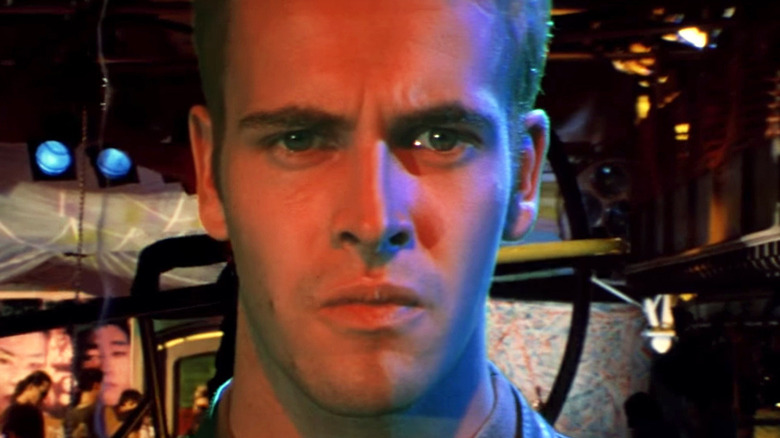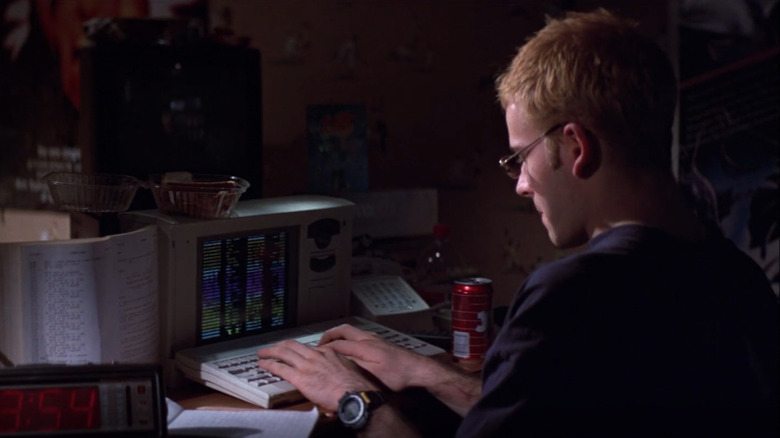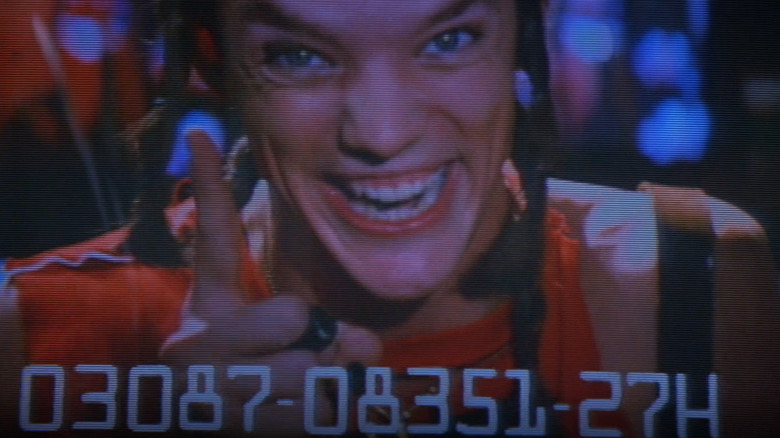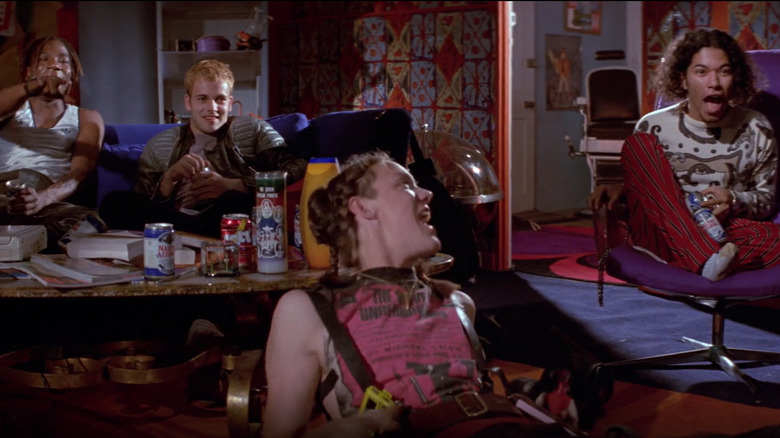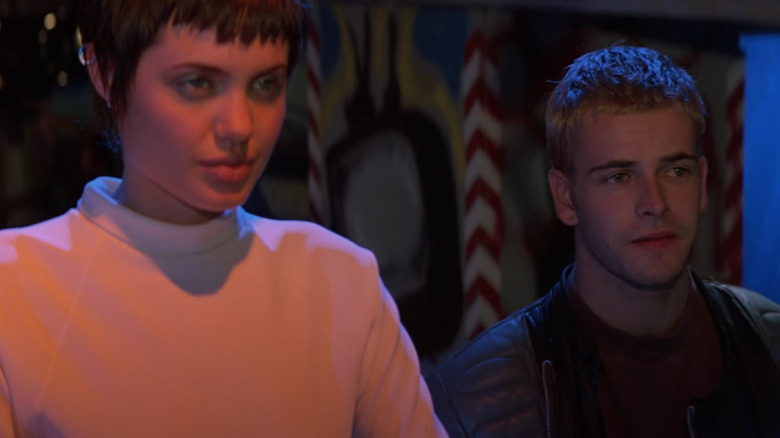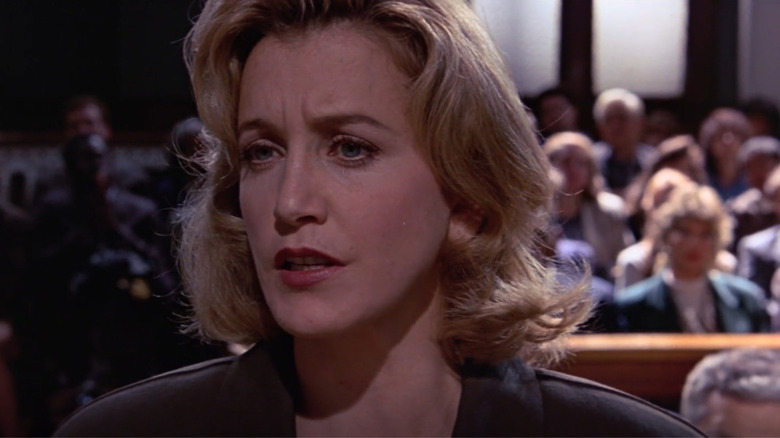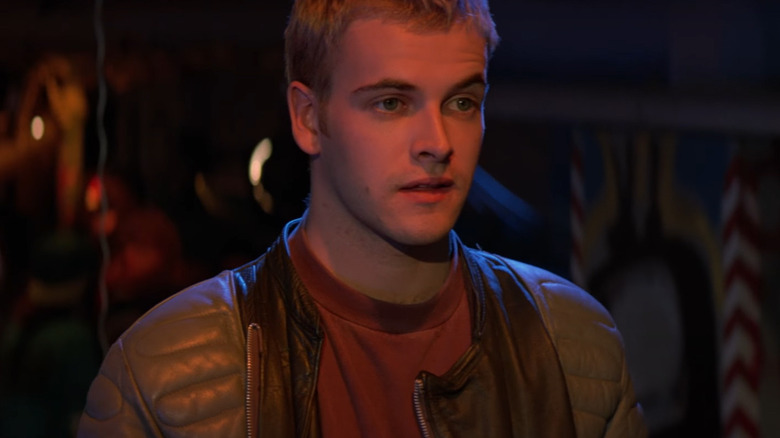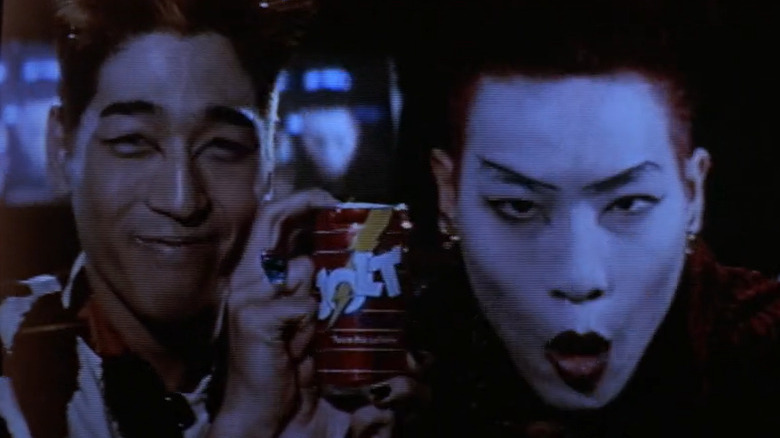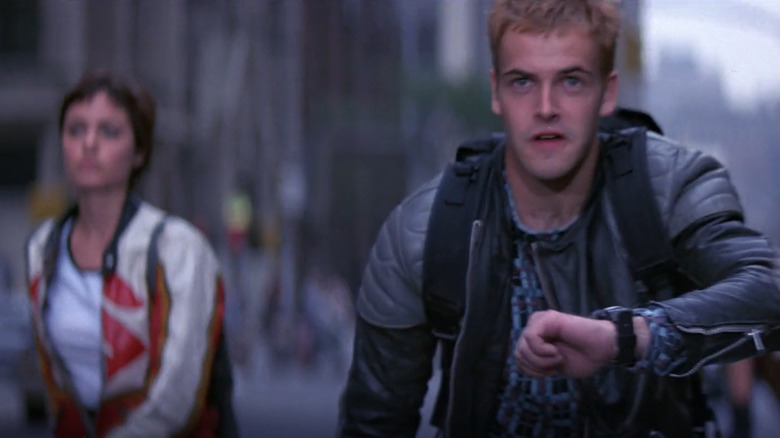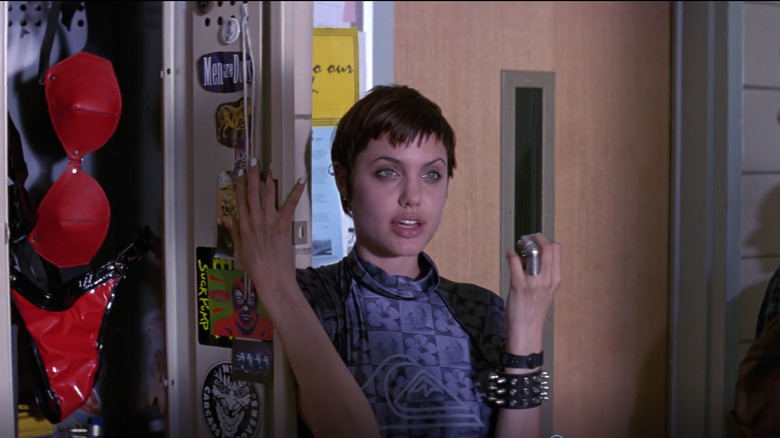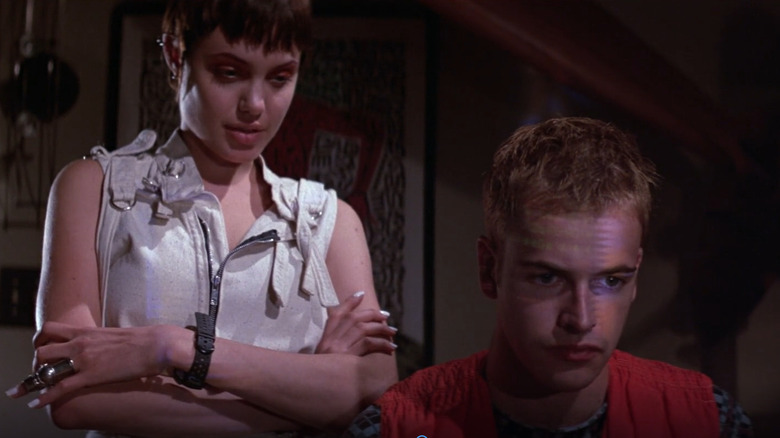Things Only Adults Notice In Hackers
During the early '90s, the internet still felt like a novel concept to the majority of the world. Trip hop enjoyed a brief but memorable stint as a mainstream music genre. Floppy disks had not yet been phased out of common use. Without these three hyper-specific global circumstances, "Hackers" could not have been made. A cyberpunk adventure starring Jonny Lee Miller and a pre-megafame Angelina Jolie, "Hackers" stands alone.
Directed by Iain Softley and written by Rafael Moreu, "Hackers" spins the tale of 18-year-old tech savant Dade Murphy (Miller) — aka "Zero Cool" or "Crash Override" — who moves to New York City and befriends a circle of like-minded digital anarchists. Once one of Dade's new acquaintances stumbles upon a cooperate embezzlement and environmental terrorism plot, a battle of wits unfolds between the eclectic pranksters and sociopathic white collar hacker Eugene Belford (Fisher Stevens), aka "The Plague."
Sadly, box office returns for "Hackers" didn't amount to half of its $20 million budget (via PCMag). However, there's plenty of anecdotal evidence to suggest it found its audience at VHS and DVD rental shops during the second half of the decade. Haven't revisited "Hackers" since you were a tween? Then you probably don't realize how much of it went over your head. These are the things only adults notice in "Hackers."
Hackers takes place in 1995, not the future
Discourse surrounding "Hackers" tends to focus on its prescience. While it does make some relevant internet-related predictions, no one seems to remember that the story begins with a flashback to 1988. The main plot begins "seven years later." So, "Hackers" takes place in 1995 — not the near future, and definitely not the distant future, as is commonly assumed. No, it's all going down during the same year the movie had its disappointing tenure in theaters. In fact, as PCMag notes, writer Rafael Moreu got his ideas for "Hackers" from spending time with actual hackers in the late 1980s. This means the movie's source material is, from the vantage point of 1995, a thing of the past.
"Hackers" has implications for what's to come in real life, to be sure. But it's much more interested in commenting on its own time than guessing what ours will be like. The hackers of "Hackers" all treat the internet as an entirely novel aspect of human existence that they, due to the dumb luck of their time of birth, can define as they will. In "Hackers," technology is something to get psyched about, instead of a source of fear and dread. You might say this movie is kind of like an inverted "Black Mirror" episode: It's full of excitement about the possibilities of the web.
Hackers does a bad job predicting what happens when a society goes online
"Hackers" offers a utopian vision of the internet where people replace static identities based in race, class, gender, and other traditional signifiers with self-assigned superhero-style code names like "Zero Cool," "Cereal Killer," and "Lord Nikon." If we contrast this vision with the modern realities of consumer habits documented on Amazon accounts, career achievements on LinkedIn pages, and social identities on Facebook profiles, it's clear that "Hackers" whiffed a lot of its predictions. The 'net hasn't provided mankind with a new way to engage with itself — rather, society as it has always existed has transposed itself to the internet and carried on, business as usual.
Furthermore, in the world according to "Hackers," surfing the web can give you power over global corporations. In the real world, where essentially every major social media and entertainment platform collects user data for targeted advertising, surfing the web pretty much throws you at the mercy of global corporations. The way things worked out is kind of a bummer!
Hackers successfully guesses that tech will become cool
When the internet was relatively new to the general public in the mid '90s, many folks thought it was frightening and wanted nothing to do with it. Hence, it became a realm of tech devotees who were less concerned with what others thought of them than most. The hackers of "Hackers" step away from diehard nerd stereotypes, however. They might be outsiders, but they're also fashionably hip, charismatic, self-confident, and conventionally good-looking. One of them is played by Angelina Jolie, for Pete's sake.
In the world of "Hackers," the cool kids and the terminally maladjusted live on the bleeding edge of tech in relative harmony. Today, this holds true. Basically everyone is online, but the earliest adapters to new tech tend to be trendy and well-connected. The stereotype of the awkward nerd hasn't vanished – as illustrated by more recent media like "The I.T. Crowd" — but the Venn diagram circles of hipsters and tech geeks overlap considerably more today than they used to. Here's proof: Elon Musk and Grimes have a kid together. "Hackers" predicted that all the way back in 1995.
The cast of Hackers is a '90s movie all-star squad
"Hackers" is a quintessential '90s movie. Anyone who rented VHS tapes on a routine basis during the Clinton administration will recognize most of the main cast instantly. In the years following "Hackers," Angelina Jolie ascended to household name status. Jonny Lee Miller didn't become as famous as Jolie, but he co-starred in director Danny Boyle's breakthrough hit "Trainspotting" (1996), which probably had about as much cultural influence as any of Jolie's projects from the same decade.
Meanwhile, standout roles in "SLC Punk!" (1998), "She's All That" (1999), and "Scream" (1996) made Matthew Lillard synonymous with youth-oriented '90s movies. Renoly Santiago popped up in era staples "Dangerous Minds" (1995) and "Con-Air" (1997). And while Laurence Mason has been a consistent presence in film and television throughout the decades, there's a certain type of movie connoisseur who's always going to think of him as knife-throwing psycho Tin Tin from "The Crow" (1994).
Veteran character actor Fisher Stevens, who starred in the "Short Circuit" movies of the 1980s, appeared in multiple major television series in the 2000s. He went on to work with Wes Anderson and the Coen Brothers during the 2010s. The '90s were not Stevens' best years, in the long run, and the same can be said of Wendell Pierce, who plays Dick Gill in "Hackers." He didn't land the role of Det. Bunk Moreland on "The Wire" until the '90s were over. Maybe that's why both men tend to play villains.
Hackers, featuring Dr. Melfi
The prolific casting team of Dianne Crittenden and Michelle Guish — whose credits collectively include "Star Wars: Episode IV — A New Hope" (1977), "Pretty Woman" (1990), and "Shakespeare In Love" (1998) — oversaw the actor-gathering process for "Hackers." We might not know a ton about what goes into casting a film, but we figure Crittenden and Guish deserve some serious acknowledgement based on how many familiar faces occupy smaller "Hackers" parts.
Today, she's famous enough to get roped into a national scandal, but in "Hackers," Felicity Huffman only spends a few seconds on screen as a state prosecutor during the opening flashback. Magician and TV personality Penn Jillette pops by as the Plague's hapless assistant. Lorraine Bracco, who would be immortalized as Dr. Melfi on "The Sopranos" by the end of the '90s, plays an Ellingson Mineral Corporation executive who conspires with the Plague. Singer and one-time Mr. Jennifer Lopez Marc Anthony kicks in a scene or two as a Secret Service agent.
"Hackers" didn't make anyone's career on its own, but for whatever reason, it was clearly a project that attracted folks on their way up.
Something seems off about Jonny Lee Miller's American accent
We mean no disrespect to Jonny Lee Miller, and presume that in the years since he filmed "Hackers," his ability to mimic an American accent has improved. However, Dade Murphy speaks with an unnaturally abrupt quality that just isn't characteristic of a Seattle native. Rather, he sounds like a dude who doesn't want anyone to figure out he grew up in the general vicinity of London.
It doesn't help matters that Dade spends the movie overshadowed by his social circle. Once he meets up with intriguing Phreak (Santiago), yammering LSD-fiend Cereal Killer (Lillard), and irreverent Acid Burn (Jolie), Dade comes off as the blandest character in just about every scene. Perhaps the creative minds behind "Hackers" figured they needed a main character the target audience could easily identify with, but the end result lacks personality.
And that's what counts, right? Personality. At least, that's the theory Sick Boy, played by Miller, rambles to a half-listening Renton (Ewan McGregor) in "Trainspotting." Oddly enough, Miller nails a Scottish accent in that dark comedy, which hit theaters less than six months after "Hackers" did. Apparently, Miller finds a Scottish accent easier to fake than an American accent.
There's a product placement for Jolt Cola, because of course there is
Some folks like to indulge in nostalgia and tell the rest of us that everything was better back in the day. But more often than not, these folks are liars. For instance, if someone tells you how great the '90s were, keep in mind that the quality and variety of widely-available energy drinks we've since grown accustomed to was inconceivable at the time. We didn't have Red Bull, or Monster Energy, or Rockstar, or anything of the sort. If we needed a serious caffeine boost and lacked the sophistication or wherewithal to brew ourselves a pot of coffee, we had to make do with Jolt Cola — "the soft drink of the elite hacker," according to underground talk show personalities Razor (Darren Lee) and Blade (Peter Kim).
In this instance of the film's Gen X-er anti-corporate sensibilities cracking through the fourth wall, product placement is framed as an advertisement on an in-universe TV show. This prompts a question: When the film flat-out tells you it's advertising something, is it true product placement?
Rollerblades used to be a thing
Some folks claim "Hackers" is a bad movie. It's possible these people don't appreciate its quirks, or are simply preoccupied with its admittedly questionable fidelity to the realities of hacking and a hacker's lifestyle. But even those who disagree with a fundamentally negative take on the movie must concede that its naysayers aren't wrong about everything.
For instance, there's quite a bit of rollerblading in "Hackers." Dade rollerblades into Cyberdelia the first time we see the hacker hangout. Later, the hackers rollerblade from various parts of the city to Grand Central Terminal in order to jack their computers into the payphones for the film's climatic mass-hack. Realizing that he's got to throw off multiple law enforcement agents, Dade hacks into a traffic light, forces it to malfunction, and causes an accident. Our hero puts innocent lives in danger in order to delay his own inevitable capture by the police. This is highly immoral and illegal, and the movie never mentions it again.
Do rollerblades make it okay to deliberately cause a car crash? Is that what "Hackers" is trying to tell us here? For that matter, what does rollerblading have to do with hacking? Director Iain Softley himself doesn't even sound like he knows what the heck is going on with the rollerblades in an interview with Vice. To heck with rollerblades! They didn't last, and we're not mad about it!
Hackers' approach to romance and gender politics is weird
Judging old films by how well they adhere to contemporary progressive social perspectives can get tricky. But we're comfortable saying "Hackers" is weird about gender and romance. Kate "Acid Burn" Libby seems like she's supposed to resonate as an independent hacker on the same level as any other character in the film. But she's also a trophy for Dade, the kind of low-level chauvinist who implies girls are innately inferior gamers early in the movie, after he's overcome the plot's various obstacles. He literally wins a date by beating her in a hack-related pranking contest. Kate does change the terms of the bet: If she wins, he's got to wear a dress to the date that originally wasn't going to happen at all unless he won. The date is sort of her idea too, then ... but only sort of.
It's as though the filmmakers wanted a female character in the spirit of the early '90s riot grrrl scene, but couldn't figure out how to write a romantic subplot that didn't follow essentially the same beats as every 1980s action movie. And let's not forget the dance party scene, in which hackers casually objectify nearby female guests for easy laughs. It's all in line with its era, but that doesn't make it any less frustrating.
The hackers' hangout closely resembles the Foot Clan headquarters from Teenage Mutant Ninja Turtles
Cyberdelia provides a space for the youth of "Hackers" to relax, socialize, and do cybercrime. In addition, and almost certainly by accident, it gives us reason to think the adventures of these hackers take place in a universe shared with a much more famous group of outlaw teenagers. Is it possible that Cyberdelia is the Foot Clan hangout from "Teenage Mutant Ninja Turtles" (1990), rebranded and under new management after the Turtles cleared out Shredder and his horrible cronies? Because they look like the same place.
Hear us out. Both establishments decorate in a manner that indicates friendliness towards outsider youth culture. Both contain ample rollerblade and skateboard ramps. Both are loaded with cutting-edge 1990s arcade game technology. Cyberdelia looks smaller than the old Foot Clan club does in this clip, but that ostensible size difference could be due to misleading camera angles. The biggest difference between the two spaces is that nobody's handing out cartons of cigarettes at Cyberdelia. Unlike Shredder, Cyberdelia wants its patrons to have healthy lungs ... and, also, to not fight the Ninja Turtles.
There's at least one obviously edited out f-bomb in Hackers
"Hackers" contains more than its fair share of funky sound editing. Most jarringly, the audio doesn't always sync up with the characters' mouth movements. The most noticeable and longest instance of this takes place during a pair of escalator rides, in which the Plague placates some executives, then explains his evil plan to Lorraine Bracco's character. But everyone's favorite sound edit in "Hackers" transpires when Kate Libby warns Dade, "I hope you don't screw like you type." Angelina Jolie's face does not reflect an authentic pronunciation of the word "screw."
We can speculate the dialogue was changed during post-production, in order to secure a PG-13 rating. As legend has it (via BBC), the Motion Picture Association's ratings board will allow one f-bomb in a PG-13 movie. Dade uses the word in a more euphemistic, and therefore less overtly sexual sense later on in the film. Thus, Kate's bad word had to go, apparently.
Still, it's a strange line of dialogue, regardless of whether or not Kate says "screw." Is she implying that Dade is bad at typing? If so, why? As far as the rest of the movie indicates, he types quickly and accurately. Does she mean she hopes he doesn't perform quickly, purposefully, and in a manner that doesn't look like much fun in the bedroom? That would make sense, but still be a very weird thing to say.
